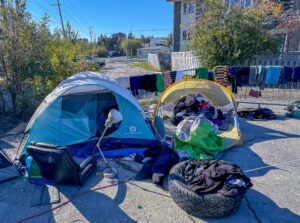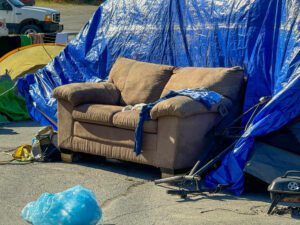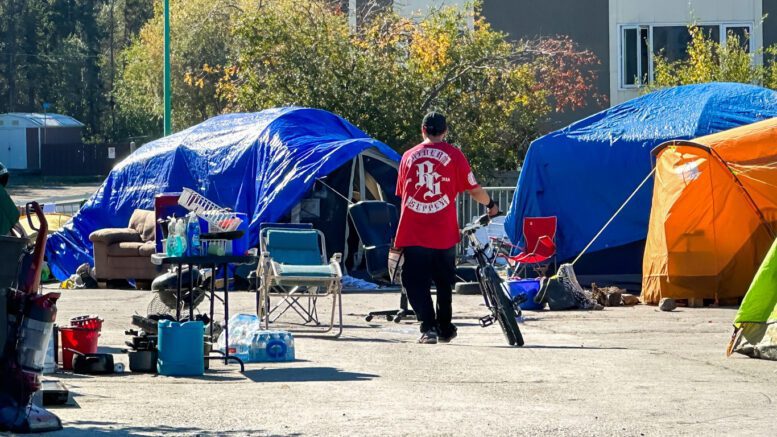“I’m at a breaking point. I’m out of options. But today we’re supposed to hear news from the GNWT or the City … about finding us a new location or public housing if possible.”
– Encampment resident Colton Migwi
The homeless encampment on 51st Street in Yellowknife is scheduled to start meeting its end on this rainy day, with all campers to be gone by end of Wednesday, as that’s when the portable toilets will be removed and fencing taken down.
The working figure from earlier encampments has been 50 people, and CKLB counted 22 tents there on Friday morning, but the GNWT insists the number is between 12 to 15 homeless campers.

Encampment resident Colton Migwi, from Behchoko. (Mariah Caruso/CKLB)
Most, if not all, are from the NWT, with the majority not being from Yellowknife.
Colton Migwi, from Behchoko, is one of the campers, who has been looked to for leadership.
“I’ve been having my name called since the start of this camp here and there: ‘Colton. Colton. We need food. We need water.’ Okay, I’m on it. I do my best, but with Salvation Army food hampers
“At every (encampment) location we’re at, I I try to ask neighbours to help us with homemade food that they could do, if possible. Like refilling jugs of water. It’s tough. Half the time I get turned down, half the time they generously help, which I’m truly grateful, but it’s not enough.”
An Assembly Committee of the Legislature was told Friday afternoon that on Monday, an inter-agency encampment working group will be with the campers to ensure they have some place to go.
Those folks who have pitched a tent in the Aspen Apartments parking lot – a vacant block due for remodeling over the winter into low-income housing — have indicated they could have been housed this summer, but declined to do so for a number of reasons.
Many told GNWT and NGO workers they have been barred from shelters for violent behavior or just didn’t want to be subject to searches for drugs or alcohol. Some have difficulty finding housing as they were just released from jail, or haven’t any proper identification.
The committee heard from Great Slave MLA Kate Reid and department officials of utility thefts, open sex acts and drug deals, and public defecation, the latter mostly in the first dozen days before the GNWT provided portable toilets.

Premier R.J. Simpson, top left screen, briefs Assembly committee on homeless encampment Friday September 6. (James O’Connor/CKLB)
Over the short term, the GNWT will work with NGOs to increase shelter capacity in Yellowknife, as it’s estimated 30 to 60 residents are unhoused at any time due to a chronic shortage of housing of all types.
MLAs from communities outside of Yellowknife on the committee questioned if enough is being done to allow people to stay in their home communities, either with shelters but preferably through more housing.
George Nerysoo is MLA for Mackenzie Delta.
“To hit the root of this problem has to come to the communities, because I know the people there. My chief knows the people there, the mayor knows the people there. Well it has to come to the communities to try to help resolve this, these social development problems. I’m just wondering if there’s funding, if there’s resources, if there’s any availability for the government to reach out to the smaller communities like Fort McPherson, for example. To see if we can help get some of our people back from Yellowknife, from Inuvik. Back to where their culture is.”
Premier R.J. Simpson said there is funding available for communities to look at creating shelters and providing services.
“The Government of the Northwest Territories is not looking to build and operate shelters in communities, but if there’s a community group who would like to take this on and spearhead this, there is funding that that’s available and we can assist communities access funding from the federal government as well.
“Our ultimate goal is not to just increase the number of shelter beds. It is actually to get people into stable housing situations, though. But I take the member’s point.”
In a recent interview with CKLB, Yellowknife Mayor Rebecca Alty said ideally the communities would be able to keep their people there, “especially the younger people who might end up here, getting into trouble and all that.”
“So they end up here, a lot of times, and that’s not the best situation,” said the mayor.
“It’s always challenging, we don’t want anybody sleeping outside. Nobody can sleep outside at minus 40, so there’s a need for housing, (treatment for) mental health and addictions.”

Homeless encampment in the Aspen Apartments parking lot. The lot will be needed starting this week for construction materials as the apartment block is being renovated for low-income housing. (Jiaxuan Josie Wu/CKLB)

Homeless encampment couch. (Jiaxuan Josie Wu/CKLB)





